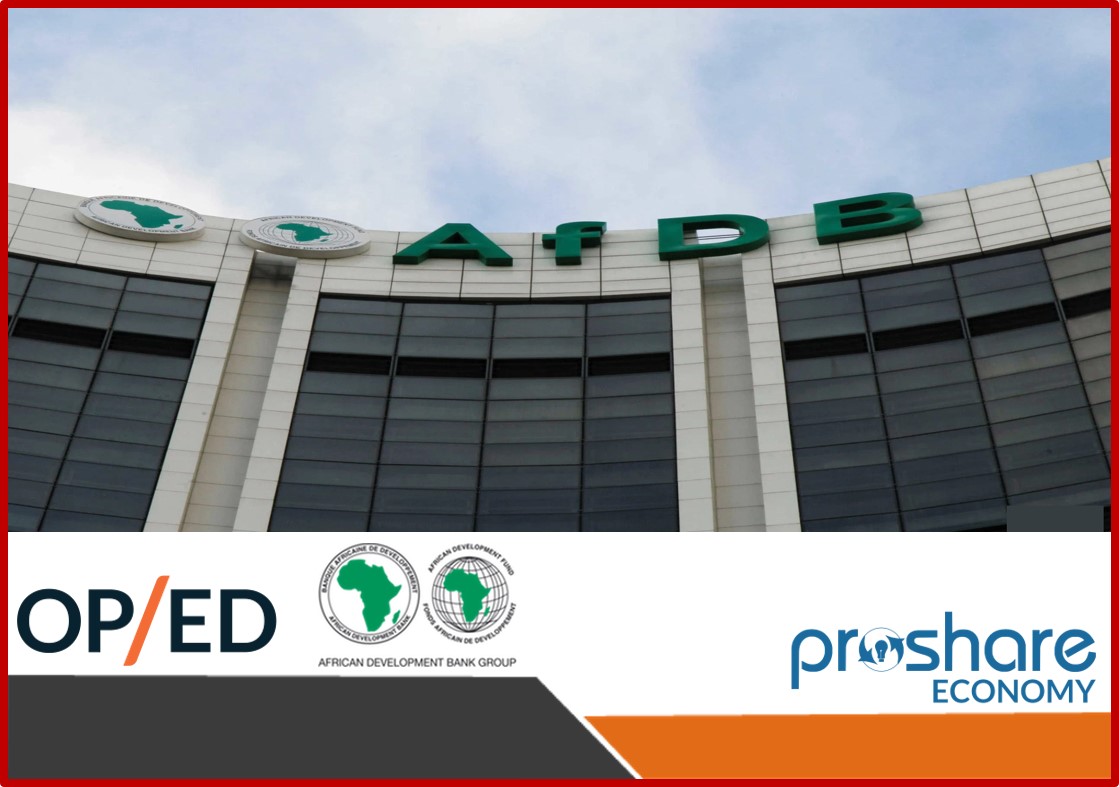Monday,July 27, 2020 / 5:35 PM / Jean-Michel Meyer Op-ed / Header Image Credit: Reuters/Ecographics
Anillustration of the new cold war that the United States and China are wagingwithin institutions and international donors.
The economic andtrade war between the United States and China is opening upfront lines inAfrica. After openly neglecting the continent at the start of Donald Trump'smandate, the US administration is working hard to block Chinese expansion andregain abandoned market shares. This is a strategy developed by the shadowadvisers of the American president since 2017.
In this fight, thetakeover of financing levers on the continent is a priority for the Americans,with the African Development Bank (AfDB) as a major target. In this context, isits president Akinwumi Adesina a pawn to be released?.
Adesina,A Stone In The Shoe Of American influence
Engaged in alip-service campaign to win a second term at the head of the AfricanDevelopment Bank at the end of August, Akinwumi Adesina has been plunged intothe heart of a fight that is beyond him. Of course, the Nigerian remains theonly candidate for his succession. And even if he can avail himself of thesupport of the African Union, he will not obtain the easy victory that everyonepromised him, essentially due to the economic and commercial rivalry betweenthe United States and China raging across Africa. In this fight, to control thedecision-making and financing levers on the continent, the AfDB, and thereforethe president who directs it, are major issues for the American camp.
TheTrump Administration's Strategy of Winning Back
Since coming topower in January 2017, Donald Trump has seemed to ignore Africa. So far, theAmerican president has received only two heads of state from the continent atthe White House. This is unprecedented. Worried about the omnipresence ofBeijing on the continent and the loss of Washington's economic influence on theground, beginning in 2018, the advisers of the Trump administrationconcocted a strategy of reconquest to counter China in Africa.
ASlow Work Of Persuasion Begins Concerning the American President and Turns IntoObsession In The Ranks of the Neoconservatives
Ironically, theoffensive was designed and led from the start by the hawk John Bolton,then-National Security Advisor.
The Americanconservatives are very worried. From 178 billion dollars in 2016, the volume oftrade between China and Africa reached 186 billion dollars in 2018, andexceeded the symbolic mark of 200 billion dollars in 2019. Even if theobjective announced by Beijing in 2014 to aim for 400 billion dollars in tradeby 2020 is proving unrealistic today, the inexorable and rapid upward trend intrade between China and Africa is irreversibly written.
This is quite theopposite of trade relations between the United States and the continent.
AttackThrough Commercial Means
The cornerstone ofthe American trade strategy on the African continent, the AGOAa (law on growthand opportunities in Africa) has a poor record for its 20 years in 2020.Launched in 2000 under Bill Clinton, AGOA offers duty-free entry into theAmerican market for 6,500 African products (petroleum, agricultural, textiles,handicrafts, etc.). Thirty-nine predominantly sub-Saharan countries benefitfrom it. AGOA goals? Help diversify trade with the continent and promoteindustrialization in sub-Saharan Africa.
However, petroleumproducts continue to represent two-thirds of American imports. According toUSAID figures, bilateral trade between the United States and the United Statesquadrupled from 2002 to 2008, to reach 100 billion dollars. But African tradeis crumbling. It fell to $ 39 billion in 2017, only to rebound slightly to $41.2 billion in 2018, mainly due to the United States' energy self-sufficiency.
Meanwhile, over thepast five years, US exports to sub-Saharan Africa have stagnated on average at$ 19 billion per year. With $ 54 billion in foreign direct investment inAfrica, the United States is still ahead of China in this area.
However, Chinesedomination in Africa is a snub for Uncle Sam. Little by little, advisers willconvince the American president to look beyond the borders of the UnitedStates. The Vice-President of the Center for Strategic and InternationalStudies (CSIS), Washington, and the President, of the Sub-Saharan AfricaAdvisory Committee for the Export-Import Bank of the United States United(Exim), Daniel Runde, among others, feed the Trump administration's perspectiveon the economic engagement of the United States in the world, in particular interms of development.
GoThrough Development Institutions, Including The AfDB
Countering China inAfrica, by relying on development institutions, has become an end in itself. Ina memo titled "The Trump Administration Will Eventually Lead the BrettonWoods System," Daniel Runde wrote in mid-2017 that "the United Stateswill seek to have a say in the upcoming appointments of the heads of themultilateral banks of development.
In October 2017,Steven Dowd, the current Executive Director of the AfDB who is therepresentative of the United States at the Bank and the chairman of the auditand finance committee of the pan-African bank, confirmed this desire. "Iwill leverage the US financial contribution to the bank to ensure that it isbest used for Africa and serves the interests of US foreign policy there."[...] I will endeavour to open Africa to American investments and know-how."This close friend of Daniel Runde then made the promise to American senators toget the post with the AfDB.
In October 2019,Daniel Rundee, a Republican loyal to Donald Trump, specified the interest ofthe Americans in controlling the AfDB to halt Beijing's long march on thecontinent. "The AfDB is an alternative to engaging in Africa that is not led byChina and it can help reframe Africa as a tremendous economic opportunity."
In a charge againstAdesina carried in a column on the American online site 'The Hill', the messageis clear. The writer, Daniel Rundee led a charge against the management of thebank by Akinwumi Adesina, its president. Runde insisted on his lack oftransparency and his support for authoritarian regimes, in particular byorganizing the AfDB's annual meetings in Malabo (Equatorial Guinea), in June2019. "Anyone who has read the classic book Tropical Gangsters will recognize thatthe government of Equatorial Guinea is probably one of the most corrupt in theworld", asserted Daniel Runde.
The offensive hadalready accelerated following the appointment of Tibor Nagy in July 2018 as USAssistant Secretary of State for African Affairs, a post left vacant forseveral months. On March 3, at the United States Embassy in Kinshasa, he beganhis speech on what "the Trump administration in Africa should do: counterChina's narrative and clearly show that the breadth and depth of the UnitedStates' engagement in Africa are second to none."
On the ground,Tibor Nagy could count on the rebirth, in May 2019, of the Export-Import Bankof the United States (Exim) chaired by Kimberly Reed, a lawyer who served assenior advisor to the Secretaries of the United States Treasury in 2004.Congress gave a mandate to the federal agency, which now has a theoreticalstrike force of $ 135 billion. It is up to the Exim to devote 20% of itsresources to unlocking financing that is capable of neutralizing Chinese offersin Africa. On May 14, 2020, the board of directors of the American agencyvalidated a loan of 4.7 billion dollars for the benefit of Mozambique to buildan LNG installation. "This is a prime example of how a revitalized Exim,thanks to the leadership of President Trump and bipartisan support fromCongress, can help ensure the use of made in USA products and services, withoutgiving way to countries like China and Russia", said Kimberly Reed.
From2018, A Tool Called Prosper Africa
Also, when JohnBolton presented the US Strategy for Sub-Saharan Africa in December 2018, hetook the opportunity to launch Prosper America. This initiative, which bringstogether the resources of more than 15 American government agencies, isintended to counter the new Silk Road (Belt & Road), traced by Beijingsince 2013, with the mission of doubling trade and investment between theUnited States and Africa. Prosper America is establishing a one-stop-shop tomake it easier for US businesses to access more than 60 business investmentsupport services. However, the initiative is slipping. "It has lost a lotof its momentum due to very slow deployment," said Judd Devermont, Africaprogram director at CSIS last June.
FollowedBy the Build Act
Another brick laidby Congress in March 2018, is the adoption of the Build Act, which created theUS International Development Finance Corporation (IDFC), and the Americandevelopment bank, with $ 60 billion in investments compared to $29 billion forits predecessor. Concretely, the Trump administration is also seeking to scorepoints by dealing directly with states. Washington is, therefore, trying tosign a free trade agreement with Kenya at all costs. Negotiations are underway.After the one concluded with Morocco in 2004, it would be the second time thatthe United States would ratify and conclude a deal with a country on thecontinent. The example would be symbolic of the return of Uncle Sam. In 2019,Kenya imports from the United States totaled 391 million dollars, against morethan 3 billion from China. In the minds of the Americans, an agreement withKenya would serve as a springboard for negotiating new agreements bilaterallywith other states.
But Washington'sneoconservatives are convinced that the United States can only effectively curbChina's stranglehold in Africa if it controls the major levers of financing onthe continent, such as the AfDB, which approved more than $ 7 billion incommitments in 2018 and which benefits from the remarkable triple-A rating frominternational rating agencies.
FinalObjective: Control The Funding Levers With Candidates Dubbed by Washington
Is thestatutory designation of a new AfDB president in 2020 a dream opportunity forWashington to maneuver and control the Pan-African institution and promote theappointment of a president committed to American interests? Except thatAkinwumi Adesina stands in the way of Washington advisers. And he is the onlycandidate to run for his succession. In addition, he is a national of Nigeria,the largest shareholder of the AfDB with 9.1% of the bank's capital. With 6.5%of the shareholding, the United States comes "only" in the secondposition.
Whatever.The bank has 80 shareholder countries, including 26 non-African countries.Daniel Runde openly contests the governance of the AfDB which gives the votingpreeminence to African countries, with "58.89% of the votes".
However,in October 2019, the Republican in a note from the CSIS on the future role ofthe AfDB, said: "at the World Bank, the United States has 15.7% of thevote and a de facto right of veto, while they do not hold a veto similar to theAfDB". One thing is obvious for the adviser: "Regional development banks workbest when they follow the golden rule, namely: whoever owns the gold sets therules". Those who finance designate the kings and commanders.
ObstaclesOn The Way To The AfDB's Capital Increase
As luck would haveit, this pressure from the United States came when Akinwumi Adesina wasnegotiating the Bank's general capital increase, which was concluded favourablyin October 2019, and will raise capital from $93 to $208billion over ten yearsfrom 2020 to 2030. This represents an increase of 125%. At the same time,Daniel Runde writes: "Shareholders are going to have to ask serious questions.The United States, as the main donor, does not have the same vote and influencewithin the AfDB as it does in other multilateral development banks," such asthe Asian Development Bank and the Inter-American Bank of development. "TheAfDB should reconsider the position of its large non-regional shareholders, whoare increasingly speaking out about the disproportionate voting power they holdin relation to the size of their contributions. If they are ready to pay, theyshould have more actions to take in the bank. "
The United Statesdid not succeed. Did Akinwumi Adesina reject them? Did he stand up againstAmerican design? Hard to say. For the moment, the protagonists remain walled insilence. But this is where the troubles of the AfDB President began.
InThe Wake of Whistleblowers Alleging Unethical Behavior
To strengthen theattacks against Adesina, the architects of the Nigerian destabilizationoperation took the opportunity of a letter sent to the governors of thePan-African bank in January 2020 by whistleblowers. The latter accused AkinwumiAdesina of unethical behaviour, favouritism in appointing Nigerians to seniorpositions, and personal enrichment. Allegations he denies. In the meantime, thegrievances against the president of the bank were leaked to the press, giving aglobal echo to the accusations against him, while he was engaged in thecampaign for his re-election. Conservative Steven Dowd, the current US chairmanof the AfDB's audit and finance committee, is suspected of being behind theleaks over the accusations affecting the Nigerian.
On May 5, aninternal bank investigation exonerated Akinwumi Adesina for lack of evidence.Annoyed, the United States threw a stone in the pond. In a letter dated May 22,US Secretary of State for the Treasury, Steven Mnuchin, expressed "seriousreservations" about the findings of the investigation. And as a member of theBoard of Directors of the AfDB, he calls for "a thorough investigation ofthese allegations by an independent external investigator". After 15 daysof silence, the Board of Governors of the AfDB accepted, on June 5, that a newinvestigation is "carried out by a neutral, honest person, of high calibrewith undeniable experience and a proven international reputation, in a periodof two to four weeks at the most, taking into account the electoral calendar ofthe bank. This mission was entrusted at the beginning of July to the formerIrish president MaryRobinson.
SuspenseAs To The Outcome, But The Battle Will Leave Its Mark
Whether cleared oraccused, what will be the fate of Akinwumi Adesina, under the threat of theAmerican steamroller? Washington has meanwhile garnered support fromSwitzerland, as well as Denmark, Sweden, Norway and Finland, according toBloomberg. The Nigerian still enjoys the backing of the African camp and therating agency S&P Global Ratings. While maintaining that AfDB's triple-Arating, S&P stated in a press release dated June 19, 2020, that "the Boardof Governors of the AfDB endorsed the conclusions of the ethics committee whichexonerated the president of any wrongdoing, although it allows for anindependent review of the report given the differing views of the Governors. Webelieve that, by our expectations, this issue has been dealt with appropriatelythrough the appropriate institutional channels. [...] We expect shareholder'ssupport to remain strong, regardless of the outcome of the independentinvestigation."
Asked by the BBC onMay 30, 2020, Nancy Birdsall, senior associate at the Center for GlobalDevelopment, an Anglo-Saxon think tank, predicted that "the US Treasurywould seek a form of discreet compromise in which no one loses face". Theend of the suspense is expected in a few weeks.
RelatedNews
1. Now Is The TimeFor A 'Great Reset'
2. An AfricanPerspective on the impact of COVID-19 and the Response to it - FBNQuest
3. Corporate,Financial Institution Downgrades On Pace for Record
4. The Case AgainstHigh Interest Rates in Time of Contagion - Bola Tinubu
5. The ComingGreater Depression of the 2020s
6. Why the GlobalSouth Should Temper Expectations Over The Basel Convention Ban Amendment
7. Of Q1'20Economic Output and GDP Forecasts - Lessons from China
9. What Would theWorld Look Like after Coronavirus: Economically, Politically and Socially?
10. Risk-WeightVariation Among Emerging Markets Banks Impedes Capital Comparisons
11. As For SouthAfrica, So For Jigawa: Understanding The Missing Point - Fasua
12. European BanksFace Weaker Revenue Outlook
13. Peter DruckerAnd The Things That Changed
14. Repositioning forRelevance in a Competitive Environment
15. Nigeria'sUnconventional Policies Aggravate External Vulnerability
16. Negative YieldsDo Not Necessarily Support Sovereign Credit
17. No Deal BrexitThreat Shifts Priorities For Autos Investment
18. Lies, DamnedLies and Statistics: How to Make Sense of FDI Data
19. Nigerian BankingSector Recovery Still Hampered By Bad Loans
20. Loan-to-Deposit RequirementCredit-Negative for Nigerian Banks
 Lagos, NG • GMT +1
Lagos, NG • GMT +1











 1372 views
1372 views












 Sponsored Ad
Sponsored Ad
 Advertise with Us
Advertise with Us









